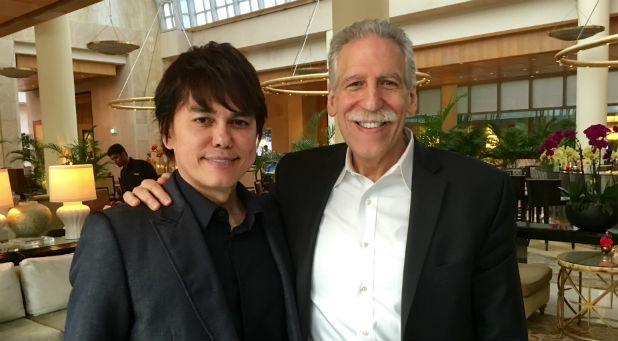While Michael Brown claims to be a critic of the excesses and errors of greater charismania, trying to find a specific name who he would regard as a heretic is nearly impossible. While Brown most notably has criticized Todd Bentley, he was shown stalwart support and affirmation of Benny Hinn, Bill Johnson, the “so-called” (in his words) New Apostolic Reformation, Bill Houston and others.
Joseph Prince was one of the few charismatic leaders who Brown has publicly criticized, and he did so in his book, Hyper Grace. Rightly so, Brown insinuated that Prince (and others) were practicing antinomians, adherents to a heresy that teaches men are not under the moral law or God or expected to strive for personal holiness. Brown’s initial estimation of Prince was quite correct.
Prince’s fame is almost entirely linked to his message of “total grace” that rejects God’s law. In fact, his prominence began after supposedly hearing God’s audible voice in 1997, which told him…
“I distinctly heard the voice of the Lord on the inside. It wasn’t a witness of the Spirit. It was a voice, and I heard God say this clearly to me: ‘Son, you are not preaching grace.’ I said, ‘What do you mean, Lord?…’Every time you preach grace, you preach it with a mixture of law. You attempt to balance grace with the law like many other preachers, and the moment you balance grace, you neutralize it. You cannot put new wine into old wineskins. You cannot put grace and law together. He went on to say, ‘Son, a lot of preachers are not preaching grace the way Apostle Paul preached grace” (Destined to Reign, Forward)
According to Prince, God wrote the Ten Commandments on two tablets of stone and the Devil “armed himself with the law to accuse and condemn man” (emphasis in original), but “when God nailed the law to the cross, He made a public spectacle of the devil and all the powers of darkness.” After the cross “the law no longer had the power to condemn man as long as he believed on Jesus. If you insist on being under the law,” warns Prince, “you are actually arming the devil again” and “the devil is the one using the law to bring about death and condemnation and to put believers under oppression!” (source link)
Prince says things like, “The law is not for you the believer, who has been made righteous in Christ! The law is not applicable to someone who is under the new covenant of grace” (same source). Needless to say, Prince isn’t mincing words like a New Covenant theologian who might stumble on the term “Moral Law” versus “Law of Christ” or “Law of Love.” No, what Prince espouses is textbook Antinomianism.
Prince denies that Christians need to ask forgiveness for their sins (and apparently overlooks the way Jesus taught us to pray, “Forgive us of our debts, as we forgive those…”), saying “Under the new covenant, we don’t have to keep on asking the Lord…for forgiveness because He has already forgiven us” (Destined to Reign, Chapter 1, Page 7). Again, this is textbook antinomianism.
Prince says insanely antinomian things like,“I have also heard some believers pronouncing, ‘If God does not judge America for all its sins, God has to apologize to Sodom and Gomorrah.’ Well, let me say this with honor and respect: If God judges America today, He has to apologize to Jesus and what He has accomplished on the cross! My friend, God is not judging America (or any country in the world today)” (Destined to Reign, Chapter 5, page 49).
Prince denies that the Holy Spirit can use the Law to convict or quicken one spiritually, writing“ You see, faith does not come by simply hearing the word of God because the word of God would encompass everything in the Bible, including the law of Moses. There is no impartation of faith when you hear the Ten Commandments preached” (Destined to Reign, Chapter 7, page 75).
And while Prince’s emphasis on free grace is refreshing compared to many of the works-heavy teaching in charismania, he clearly errs on the other side of the road and winds up in the southside ditch known as antinomianism.
Brown’s rare and brief moment of discernment would not last long, however. He has now met with Prince and come to agreements regarding what Prince says his theology is. You can read that article here. Brown recants his criticism of Prince, and while recognizing a few reservations, embraces Prince as a fellow brother in Christ.
Prince’s antinomianism aside, he still practices Word-of-Faith theology and preaches the prosperity Gospel. These were not addressed by the charismatic apologist, Brown.
Discernment is a gift of the Holy Spirit, that unlike the miraculous sign gifts (2 Corinthians 12:12) didn’t pass away with the Apostles. It seems that Brown’s charismania lacks the Holy Spirit almost altogether, if the absence of discernment in their camp is any indication. The Scriptures teach us that those who creep in do it “unawares” (Jude 1:4) and that those who introduce destructive doctrines do it “secretly” (2 Peter 2:1).
TD Jakes doesn’t admit Modalism (even though his website proves it), Joel Osteen doesn’t admit teaching the prosperity gospel (even though his sermons prove it), Michael Brown won’t admit to being a part of NAR (even though the facts prove it) and Joseph Prince will deny he’s an antinomian (even though his full body of work screams it).
Folks, false teachers don’t admit to being false teachers. That might just be discernment rule numero uno.











